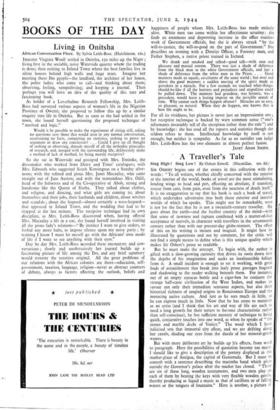BOOKS OF THE DAY
Living in Onitsha
African Conversation Piece. By Sylvia Leith-Ross. (Hutchinson. Ms.) IMAGINE Virginia Woolf settled in Onitsha, reo miles up the Niger ; living first in the sociable, noisy Waterside quarter where the trading is done; then retiring to Inland Town where the best families live in silent houses behind high walls and ,huge trees. Imagine her meeting these Ibo people—the landlord, the architect of her house, the polite ladies who come to call—and thinking about them; observing, feeling, sympathising; and keeping a journal. Then perhaps you will have an idea of the quality of this rare and fascinating book.
As holder of a Leverhulme Research Fellowship, Mrs. Leith- Ross had surveyed various aspects of women's life in the Nigerian Province of Owerri; she proposed to follow this up by a similar enquiry into life in Onitsha. But as soon as she had settled in the town, she found herself questioning the proposed technique of " method and logic."
Would it be possible to make the experiment of sitting still, asking no questions save those that would arise in any normal conversation, ascertaining no facts, computing no statistics, seeking to prove no argument or draw any conclusion? . . . Could I give up all thought of seeking or observing, denude myself of all the orthodox principles of research, and, merged with the surrounding life, deliberately make a method of lack of method, by being merely receptive?
So she sat in Waterside and gossiped with Mrs. Eminike, the dressmaker who worked from Derry and Toms' catalogues; with Mrs. Edwards who suggested South Kensington on a Sunday after- noon; with the refined and pious Mrs. Janet Macaulay, who came straight out of Jane Austen; and with the tremendous Mrs. Odiii, head of the fishwives and of the Co-operative of Aboh, strong and handsome like the Queen of Sheba. They talked about clothes, and religion, and dancing, and what girls are coming to; about themselves and their jobs, their husbands and children, about witches and scandals ; about the leopard—almost certainly a were-leopard- that appeared in Inland Town, and the wedding that had to be stopped at the last minute. The receptive technique had its own discipline, as Mrs. Leith-Ross discovered when, having offered Mrs. Macaulay a lift in a car, she found herself involved in visiting all the pious lady's relations—" By instinct I want to give orders, to forbid any more halts, to impose silence upon my noisy party ; by training I know I must let myself go with the-Africans' own mode of life if I want to see anything with their eyes."
Day by day Mrs. -Leith-Ross accorded these encounters and con- versations ; slowly and unobtrusively her journal builds up a fascinating picture of life among the Ibo, and any brief summary would travesty the sensitive original. All the great problems of our relations with the African colonies are there—education, self- government, taxation, language, religion—never as abstract counters of debate, always as factors affecting the outlook, beliefs and
happiness of people whom Mrs. Leith-Ross. has made entirely alive. White men too come within her affectionate scrutiny : she finds an enormous and depressing increase in the office routine- work of Government officials, but she is always struck " by the will-to-justice, the will-to-good on the part of Government." She describes an evening with a District Officer, a Forestry man, and Father Stephen, a native priest trained in Ireland.
We drank and smoked and talked—good talk—with ease and pleasure and mutual esteem. There was just a shade of deference from the black man to the white Government officials, and just a shade of deference from the white men to the Priest. . . . Good manners made us equals, co-citizens of the same world ; but over and above the good manners a sudden moving of the spirit made us partakers in a miracle. For a few seconds we touched what-things- should-be-like if all the barriers and prejudices and stupidities could be pulled down. The moment had grandeur, was historic, was a precedent, would leave a lasting imprint on the invisible annals of time. Why cannot such things happen oftener? Miracles are so easy, so pleasant, so natural. When they do happen, one knows that is how life ought to be.
For all its vividness, her picture is never just an impressionist one ; her receptive technique is backed by wary common sense (" one's informants invariably tell of the exception rather than the rule") and by knowledge: she has read all the reports and statistics though she seldom refers to them. Intellectual knowledge by itself is not enough; but neither is sympathy. As far as an outsider can judge Mrs. Leith-Ross has the two elements in almost perfect fusion.
JANET ADAM SMITH.


























 Previous page
Previous page